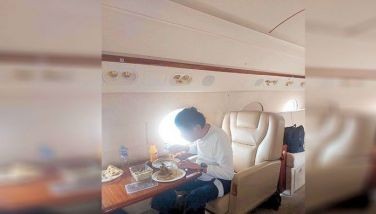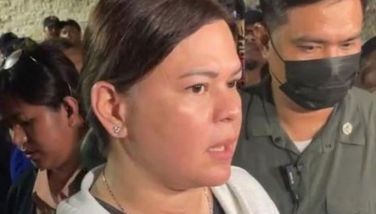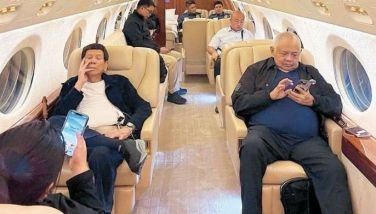Nobody is expecting it to, but Palace says government can't afford to test all Filipinos for COVID-19
MANILA, Philippines — Malacañang on Tuesday again said that the government is not capable of testing everyone for COVID-19, something that nobody expects it to do.
Government officials, including presidential spokesperson Harry Roque and 'Chief Testing Czar' Vince Dizon, have repeatedly said that calls for mass testing mean a call to test all Filipinos.
"If we can afford it, why not? But the reality is, we can't afford testing all 110 million Filipinos," Roque said in a mix of English and Filipino on Tuesday.
In a recording of an Inter-Agency Task Force on the Management of Emerging Infectious Diseases meeting that was aired Tuesday morning, Health Secretary Francisco Duque III also said that the Philippines cannot test all of its citizens, adding "no country can do that."
He said the government may be able to test 1% of an estimated population of 109 million by 2021.
However, advocates of mass testing, which now include allies of President Rodrigo Duterte in the House of Representatives, are not asking for all Filipinos to be tested.
Instead, mass testing is conditioned on widespead, timely and accessible free tests for all those who need it, including: those exhibiting COVID-19 symptoms, both symptomatic and asymptomatic individuals who have been exposed to someone infected with the virus, health workers and other frontliners.
The government's own expanded targeted testing goals are not so different from those outlined by mass testing advocates but it continues to face criticism because of its slow ramp up of actual tests conducted even as it continues to tout its supposed testing capacity achievements.
Ambitious plans, slow rollout
Early this month, the Inter-Agency Task Force on Emerging Infectious Diseases approved a plan to expand national testing to include asymptomatic individuals.
Dizon also announced the prioritization of non-medical front liners and those working in critical economic zones.
The same intiative seeks to test 10 million Filipinos in the next eight to ten months.
Under the previous guidelines, healthcare workers and patients with severe or critical and mild symptoms and the vulnerable populations were prioritized for RT-PCR testing.
Latest data from the health department shows that 1.08 million Filipinos have been tested for novel coronavirus as of July 19.
Health Undersecretary Maria Rosario Vergeire in June said the department is aiming test around 1.63 million Filipinos — about 1.5% of the population—by the end of July.
To achieve this goal, the government would have to test over 500,000 people in ten days.
Even as the Palace boasts that it has exceeded its daily testing capacity goal of 50,000, it has yet to actually conduct even its previous goal of 30,000 tests per day.
'Pooled testing'
Roque on Monday also announced that the government was looking into pooled testing to further maximize its remaining test kits.
"We are considering what is called pooled testing, wherein you use one kit to conduct swab tests for 10 people. If it turns up positive, you test them individually using PCR."
He added that, if enacted, 2.5 million of the government's remaining 10 million tests would be allocated to conduct pooled testing.
As of July 21, the health department has confirmed 70,764 novel coronavirus infections, far outpacing the a UP researcher's already ammended forecast of 65,000 by the end of the month which was increased from 60,000 following several spikes in the country's daily cases.
READ: COVID-19 cases may breach 65,000 by end of July, 100,000 by end of August — UP researcher
Senators urge DOH to use affordable Filipino-made test kits
Opposition senators on Saturday urged the health department to use lower-cost and locally-produced test kits developed by the University of the Philippines National Institutes of Health instead of relying on imported brand to increase COVID-19 testing capacity in the country.
"The country is ramping up COVID-19 testing, but locally manufactured, world-class P1,320 PCR test kits are gathering dust in laboratories due to the inaction of Health Secretary Francisco Duque III,” minority senators Franklin Drilon, Risa Hontiveros and Kiko Pangilinan said in a joint statement.
The senators cited an interim report indicating that the UP-developed test kits rank among the world's best and perform even better than some of the imported kits in terms of sensitivity, specificity and confidence interval.
The Filipino-made test kits are signigicantly less expensive than their Chinese and Korean counterparts, which cost more than double or between P4,000 and P8,000. — with reports from Ratziel San Juan
- Latest
- Trending
































